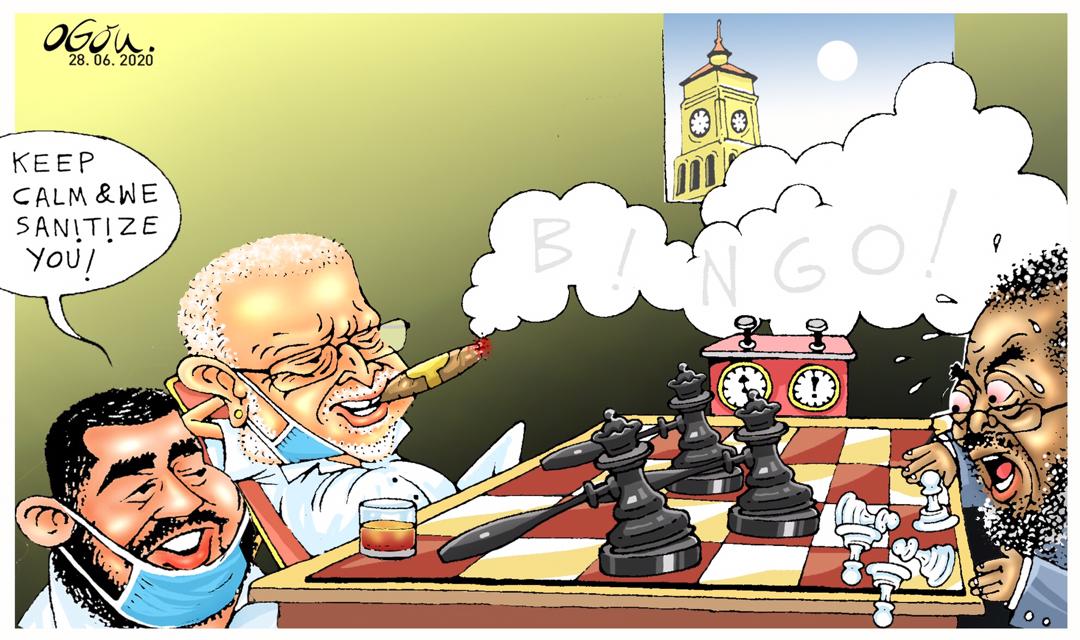City businessman Sudhir Ruparelia, who is the proprietor of Ruparelia Group of Companies, is having the last laugh after court ruled Bank of Uganda erred in closing and selling Crane Bank to dfcu bank, after flouting all the regulations of winding up a company and putting it under receivership.
Besides that victory, court had ruled that dfcu bank erred on taking over properties that once housed Crane Bank branches across the country, which had been leased by the Bank from Meera Investments Limited.
Dfcu Bank took over the property in 2016 after they bought Crane Bank from BoU at a paltry Shs200m, thereby inheriting its assets and liabilities.
They thus set up dfcu branches in all the 48 properties across the country and occupied them until last year, when court ruled that dfcu had illegally taken over properties belonging to Sudhir’s Meera Investments Limited and that they should vacate them, on top of compensating their owners for losses they had incurred during the time of illegal occupation.
Dfcu bank has since vacated and or evicted themselves from many of Meera Investments properties, including Crane Chambers.
On Tuesday Sudhir was the happiest man on earth after the Court of Appeal upheld a decision by the Commercial court in a suit filed by Bank of Uganda accusing him and his Meera Investments of illegal shareholding transfer.
Sudhir has since 2017 been fighting a protracted legal battle over claims from BoU that he siphoned Shs397Bn from Crane Bank to construct the 48 branches.
On 20th October 2016 the Bank of Uganda took over management of Crane Bank as per the Financial Institution ACT 2004, wound up the country, put it under receivership, as per section 94 of the Financial Institutions Act.
From then, Crane Bank was conducting banking services but under the management and control of BoU.
It was then that BoU and Crane Bank in Receivership sued Sudhir over the frivolous charges of siphoning money from his own bank, which BoU had reportedly injected in Crane Bank as recapitalization facility.
As a way of squeezing the Shs397Bn from Sudhir, BoU officials wanted to attach the 48 properties then housing the defunct Crane bank branches and sell them to dfcu Bank.
The land on which the properties are registered under freehold land tenure system.
Bank of Uganda had also contended that Sudhir and Meera Investments beneficially owned and controlled 100% of the shares, which contravenes section 24 of the Financial Institutions Act.
Bank of Uganda Lawyers led by Albert Byamugisha argued that Sudhir was the beneficial owner of the 47.33 of the shares registered in the name of White Sapphire Limited, a Company nominally owned by Rasikal Chhotalal Kantaria.
It also argued that a further 4% share that Sudhir issued Jitenderia Sanghai also belonged to him and that Sudhir or the Ruparelia Group was the beneficial owner of the shares transferred to Rasikal Chhotalal Kantaria and Jitendra.
Matters Of Contention In Suit
One of the issues under contention was whether Sudhir owned 100% of the Shares in Crane Bank. The Commercial Court was also to determine whether the Company placed under receivership could be sued.
Bank of Uganda had sought an order to have the Ruparelia Group surrender 48 freehold certificates of title comprising the defunct Crane Bank branches across the country.
However, Sudhir’s lawyers led by Peter Kabatsi, of Kampala Associated Advocates (KAA), during the hearing asked court to strike out the suit, arguing that the BoU and Crane Bank in Receivership had no locus or capacity to sue their client.
They cited sections of the Financial Institutions Act 2004 and argued that Crane Bank lost the power to sue and be sued from 20th of January 2017 when it was placed under receivership.
Bank of Uganda lawyers however insisted that liquidation does not take away its corporate personality and that receivership is a management situation since there was no legal change as capacity of a Company to sue or be sued.
After hearing both sides, Court found that Bank of Uganda had in September 2013 approved Rasiki Kantarai, one of Crane Bank’s shareholders, to transfer her 47.33% shareholding to a Mauritian incorporated company White Sapphire. The other shareholder was another alien Jitendra
Sanghani with 4% shareholding.
Commercial Court Judge, David Wangutusi, in a ruling delivered in August 2019, dismissed the application and directed bank of Uganda to pay costs to Sudhir.
Justice Wangutusi argued that Sudhir or Ruparelia Group was not the major shareholder in Crane Bank.
The court found that Crane Bank majority shareholder were non-Ugandans based in
Mauritius, who under the land law in Uganda were not legible to hold freehold registered land. He said the majority shareholders being noncitizens rendered Crane Bank likewise noncitizen, observing that evidence on record showed that the majority of the shares were owned by White Sapphire.
“It is clear from the evidence on record that the majority of the shares were owned by White Sapphire, a company incorporated in Mauritius. That it owned the majority share was a matter well known by the Central Bank because 47.33% of the shareholding was transferred to White Sapphire with the approval of Bank of Uganda” said Justice
Wangutusi.
He added that the constitution and the Land Act bar noncitizens from acquiring or holding freehold land titles.
“Having found that the respondent is a noncitizen for the purposes of the Land Act and the constitution, an attempt to confer freehold title upon it would be an illegality because the holding of the shares by noncitizens prevented them from owning land under the tenure that the respondent’s/plaintiff’s prayer in the plaint seeks,” said the Judge.
About whether Crane Bank in Receivership could sue or be sued, Justice Wangutusi ruled that section 96 of the Financial Institutions Act insulated Crane Bank under receivership from Court proceedings, execution or other legal processes.
However, despite Justice Wangutusi’s ruling, Bank of Uganda (Crane Bank in Receivership) appealed, arguing among others that the Judge erred in law by stating that since Crane Bank was being controlled by non-Ugandan citizens, they were not supposed to hold free hold titles.
Little did BoU know that a Panel of Court of Appeal Justices led by the Deputy Chief Justice Alfonse Owiny Dollo and Cheborion Barishaki would uphold Justice Wangutusi’s ruling and dismiss the appeal with costs to Sudhir and the Ruparelia Group of Companies.
![]()




























